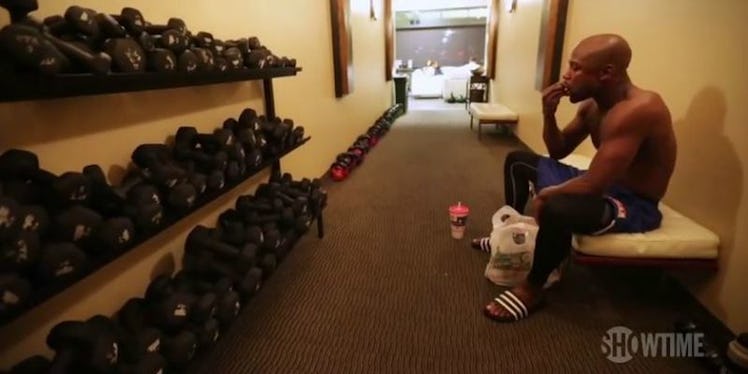
Why Athletes Can Eat Like Sh*t And Still Have Perfect Bodies
Earlier this month, we watched as the DeAndre Jordan saga played out like an episode of "Days of our Lives" -- which is booming in the women's 18-49 demo, by the way.
And emoji aside, one anecdote in particular from the Jordan story commanded more attention than any other.
I'm talking about the night Doc Rivers, Steve Ballmer, Blake Griffin and several other members of the Clippers held out in DeAndre Jordan's house, waiting for the center to resign with the team.
Naturally, they got hungry during the sit-in, and when the Clips' billionaire owner, Steve Ballmer, offered up his credit card to feed the masses, the consensus wasn't to order in greek yogurt and chia seeds.
No, Griffin and co. opted for Raising Cane's, a chicken finger Mecca of sorts.
Last night we hit the Cane's Challenge! Take your match ticket to any DFW Raising Canes today for a BOGO box combo! pic.twitter.com/nolfj9dgR4 — FC Dallas (@FCDallas) July 19, 2015
And apparently, the Clippers consortium was quite hungry because DeAndre's mom reportedly picked up 50 bags of the Southern staple.
In a recent piece for The Players' Tribune, Griffin wrote,
Raising Cane's is a fast-food restaurant that specializes in chicken fingers, crinkle cut fries and Texas Toast. It's incredibly delicious. This is not sponsored content. I love it.
That got me thinking, how is it that superstar athletes like Blake Griffin and DeAndre Jordan can eat all the crappy food they want, yet still stay as chiseled as Michelangelo's David?
Yes, other than Paul Pierce having no idea how to use emoji, that's exactly what I took away from that situation.
pic.twitter.com/SIyHJjDScR — Paul Pierce (@paulpierce34) July 8, 2015
It's not just Griffin and Jordan, Floyd Mayweather Jr. eats McDonald's like it's his job.
[Video] Mayweather Rolls Up To McDonalds Playing Music After Winning Canelo Fight! http://t.co/g5IavA1Cxx pic.twitter.com/J7f3mGXuh0 — Karen Withers (@HoodPlugPromo) May 28, 2015
And Michael Phelps consumes 12,000 calories a day when he's training, while Dwight Howard used to eat so much candy his friends and family actually held an intervention.
Furious Pete Takes On Michael Phelps Diet Challenge Eating ... - http://t.co/eKGsgy8lXv #viral #viralvideo #videos pic.twitter.com/NvYQQegIio — VIRAL VIDEOS - 2015 (@areyousureviral) June 30, 2015
I know you're thinking there's an obvious answer here, but there's more to it than the fact that professional athletes train and perform like freaks, so it doesn't matter what they eat.
Here's why athletes can not only eat like sh*t and still maintain perfect bodies, but get more bang for their buck in the process.
It's no secret athletes burn a ton of calories when they train and compete, so replenishing their bodies with a high-calorie meal -- particularly one as delicious as Raising Cane's -- isn't just OK, it's necessary.
The golden rule, according to Dr. Dena Bravata, an affiliate researcher at Stanford University, is this:
The overwhelming body of science continues to show that any diet will succeed if you take in fewer total calories than you burn.
Basically, if you hit the punching bag as hard as Mayweather, you could live at McDonald's and still keep a six-pack.
But a recent study shows that there could be more to the basic principle of staying fit if you burn off more than you ingest.
Michael Cramer, a graduate student at the University of Montana, had 11 "highly trained" male athletes complete a 90-minute endurance workout.
Following the workout, some of the athletes consumed a hash brown, hotcakes and orange juice -- McDonald's breakfast, anyone? -- and the remaining athletes took down organic peanut butter, Clif Shot Bloks and Gatorade.
Fast forward to two hours later.
The McD's breakfast crew next consumed a hamburger, fries and a coke, while the organic peanut butter kids put down Power Bar and Cytomax goodies.
Two hours after that, all the athletes rode about 12.5 miles on a stationary bike. Yay, cramps!
While all the food consumed had about the same calorie, carb and protein content, the fast food had a lot more sodium and a little more fat.
A week later, the test subjects swapped places, and you know what they found?
Not only was there little to no difference in all of the athletes' work-out time trials, but muscle glycogen levels were actually higher in athletes who consumed the fast food.
According to the RealClearScience Journal Club,
Glycogen is a key energy source in muscles that's primarily replenished through carbohydrate intake. Think of glycogen as your muscles' fuel; when it's depleted, exercise performance suffers.
In case you were wondering, the test athletes also experienced similar stomach discomfort regardless of what they ate during the experiment, and there was no difference in their cholesterol, triglyceride, insulin or glucose levels.
Obviously, this is a relatively small sample size, but I have a hunch that if LeBron James, Blake Griffin, DeAndre Jordan and Dwight Howard participated in the same experiment, you'd get very similar results.
Kerry Stewart, an exercise physiologist and professor of medicine at Johns Hopkins University, said,
Dietary fat provides nine calories per gram, whereas carbs provide about four per gram.
Fat is "energy dense," which means Michael Phelps, Floyd Mayweather and Tim Lincecum don't just like crappy food, they kind of need it.